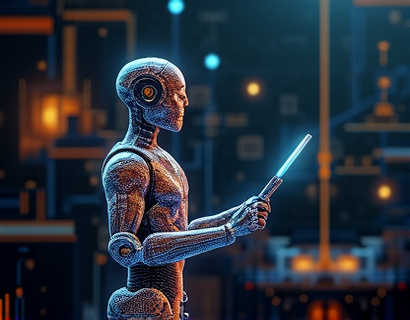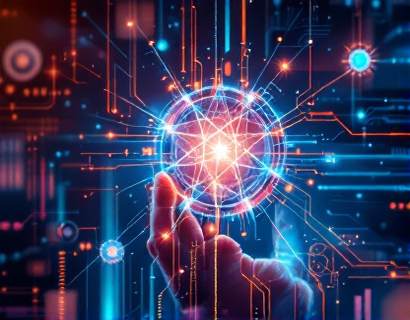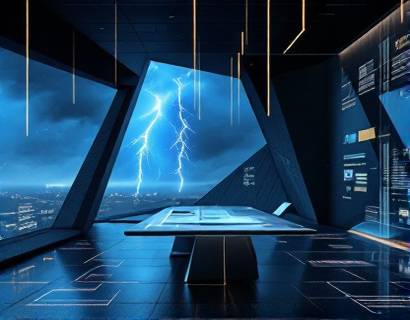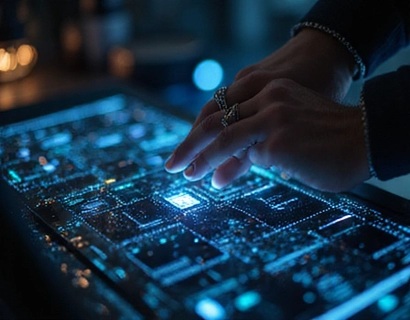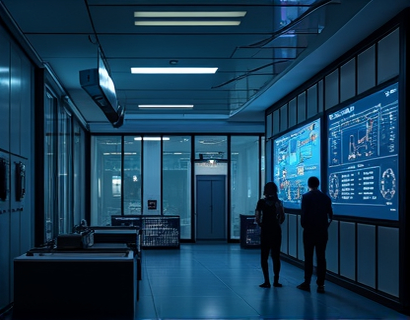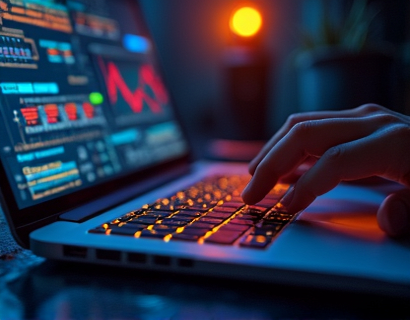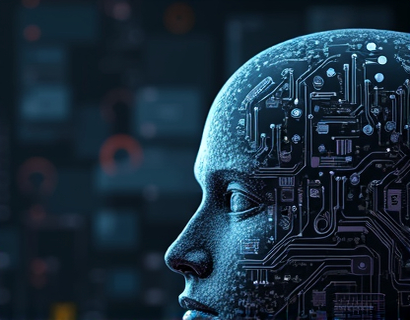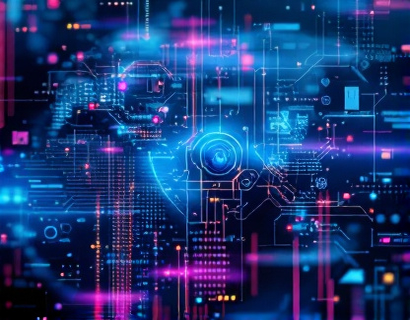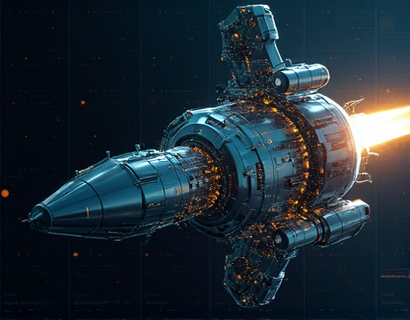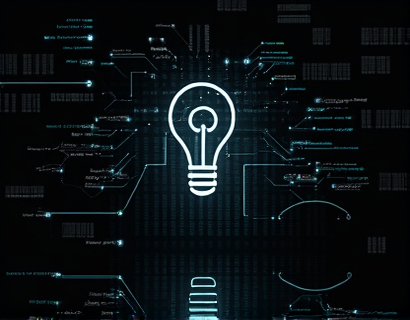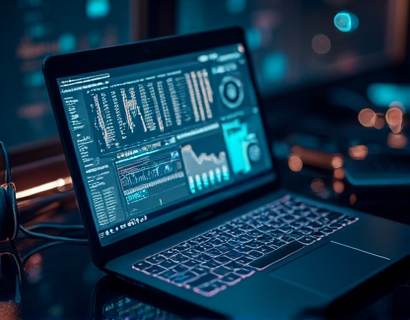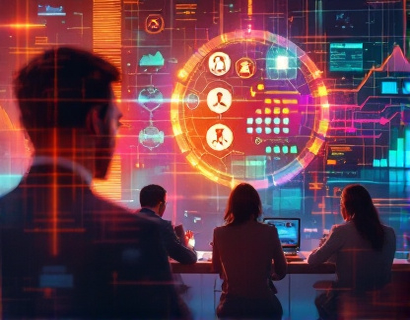AI and Crypto Synergy: Elevating Digital Experiences for Innovators in the Crypto Ecosystem
The intersection of artificial intelligence (AI) and cryptocurrency is creating a transformative landscape for digital innovators. This synergy is not just about combining two advanced technologies but about redefining how we interact with, develop, and experience crypto applications and services. The fusion of AI and cryptocurrency is elevating the digital experience, offering unprecedented levels of security, efficiency, and personalization. This article delves into the advanced technologies and innovative strategies that are reshaping the crypto ecosystem, providing tech-savvy innovators with cutting-edge tools to enhance their digital journeys and explore the future of connectivity.
The crypto space has always been at the forefront of technological innovation, embracing blockchain, decentralization, and smart contracts. However, the integration of AI is taking this evolution to a new level. AI's ability to process vast amounts of data, learn from patterns, and make predictions is proving invaluable in the crypto domain. From enhancing security measures to optimizing trading strategies, AI is becoming an indispensable tool for crypto enthusiasts and professionals alike.
Enhanced Security Through AI
One of the most significant benefits of AI in the crypto ecosystem is the enhancement of security protocols. Cryptocurrencies, by their nature, are vulnerable to various types of attacks, including hacking, phishing, and smart contract vulnerabilities. AI algorithms can detect anomalies and suspicious activities in real-time, providing a robust defense against potential threats. Machine learning models trained on historical data can identify patterns that indicate a security breach, allowing for proactive measures to be taken.
For instance, AI-powered systems can monitor blockchain transactions and network activities, flagging any deviations from normal behavior. This real-time monitoring is crucial in a decentralized environment where traditional security measures may not be as effective. Additionally, AI can enhance the security of private keys and wallet management, reducing the risk of unauthorized access. By integrating AI into security frameworks, crypto platforms can offer users a higher level of trust and confidence in their digital assets.
Optimized Trading Strategies with AI
Trading in the crypto market is inherently volatile and complex, making it challenging for even the most experienced traders to make informed decisions. AI algorithms can analyze vast amounts of market data, including price movements, trading volumes, and news sentiment, to generate insights and predict future trends. These predictive models can help traders identify optimal entry and exit points, manage risk, and maximize returns.
Automated trading bots powered by AI can execute trades based on predefined strategies, 24/7, without emotional bias. These bots can adapt to changing market conditions, learning from past trades to improve future performance. For individual traders, this means access to sophisticated trading tools that were previously only available to large institutions. The democratization of advanced trading strategies through AI is empowering a new generation of crypto traders.
Personalized User Experiences
The crypto ecosystem is diverse, with a wide range of applications and services catering to different needs and preferences. AI can play a pivotal role in personalizing these experiences, tailoring recommendations and interfaces to individual users. By analyzing user behavior, preferences, and historical data, AI systems can provide customized suggestions for crypto assets, investment strategies, and educational resources.
For example, a crypto wallet app powered by AI can learn a user's transaction patterns and suggest optimal times for sending or receiving funds based on network congestion and transaction fees. It can also offer personalized portfolio management advice, highlighting assets that align with the user's risk tolerance and investment goals. This level of personalization not only enhances user satisfaction but also increases engagement and loyalty to the platform.
Smart Contract Optimization
Smart contracts are a cornerstone of blockchain technology, automating and enforcing agreements without intermediaries. However, the complexity of smart contracts can lead to vulnerabilities and inefficiencies. AI can optimize smart contract code, identifying potential bugs and vulnerabilities before deployment. By analyzing millions of lines of code and comparing them against known vulnerabilities, AI can suggest improvements and best practices.
Moreover, AI can enhance the execution of smart contracts by optimizing gas usage and transaction costs. By predicting network conditions and adjusting contract parameters accordingly, AI can ensure that smart contracts operate efficiently and cost-effectively. This optimization is particularly crucial for decentralized applications (dApps) that rely on multiple smart contracts working in tandem.
Decentralized Finance (DeFi) Innovations
DeFi has emerged as a revolutionary force in the crypto space, offering decentralized alternatives to traditional financial services. AI is playing a significant role in advancing DeFi platforms by improving risk assessment, fraud detection, and user experience. AI-driven risk management systems can evaluate the creditworthiness of users and the stability of DeFi protocols, reducing the likelihood of defaults and losses.
Fraud detection in DeFi is another area where AI shines. By analyzing transaction patterns and user behavior, AI can identify and flag suspicious activities, such as wash trades and sybil attacks. This real-time monitoring helps maintain the integrity of DeFi platforms and builds trust among users. Additionally, AI can enhance the user experience in DeFi by providing intuitive interfaces and seamless interactions, making complex financial instruments accessible to a broader audience.
Supply Chain and Asset Management
Beyond trading and finance, AI and crypto are transforming supply chain management and asset management. Blockchain's transparency and immutability, combined with AI's analytical capabilities, create powerful tools for tracking and verifying the provenance of goods. Smart contracts can automate payment processes and ensure compliance with regulatory requirements, reducing fraud and increasing efficiency.
In asset management, AI can optimize the allocation and management of crypto assets within a portfolio. By analyzing market trends, economic indicators, and asset performance, AI can recommend strategic adjustments to maximize returns and minimize risk. This data-driven approach is particularly valuable for institutional investors and fund managers looking to integrate crypto into their asset portfolios.
Future of Connectivity and Interoperability
The synergy between AI and crypto is not only enhancing individual applications but also paving the way for a more interconnected and interoperable ecosystem. Cross-chain solutions, enabled by AI, allow different blockchain networks to communicate and transact with each other seamlessly. This interoperability is crucial for building a unified crypto ecosystem where users can interact with a wide range of services and assets without barriers.
AI-driven protocols can facilitate the transfer of assets and data across different blockchains, ensuring compatibility and security. This interconnectedness opens up new possibilities for decentralized applications, enabling more complex and integrated services. For instance, a user could seamlessly move assets between a DeFi platform, a NFT marketplace, and a social media network, all while benefiting from AI-enhanced security and personalization.
Challenges and Considerations
While the potential of AI and crypto synergy is immense, there are challenges and considerations that must be addressed. One of the primary concerns is the regulatory landscape. As AI and crypto continue to evolve, regulators are grappling with how to oversee these technologies to prevent misuse and ensure consumer protection. Innovators must stay informed about regulatory developments and design solutions that comply with existing and emerging regulations.
Another challenge is the technical complexity of integrating AI with blockchain technology. Developing robust and scalable solutions requires expertise in both domains. Collaboration between AI researchers, blockchain developers, and crypto professionals is essential to overcome these technical hurdles. Additionally, ensuring the ethical use of AI in the crypto space is paramount, avoiding biases and promoting transparency in AI-driven decision-making processes.
Conclusion
The fusion of AI and cryptocurrency is revolutionizing the digital ecosystem, offering innovative solutions that enhance security, optimize trading, personalize user experiences, and transform various industries. For tech-savvy innovators, this synergy presents a wealth of opportunities to create cutting-edge applications and services that redefine connectivity and user engagement. As the crypto and AI landscapes continue to evolve, embracing this synergy will be key to staying ahead in the rapidly changing digital world.





